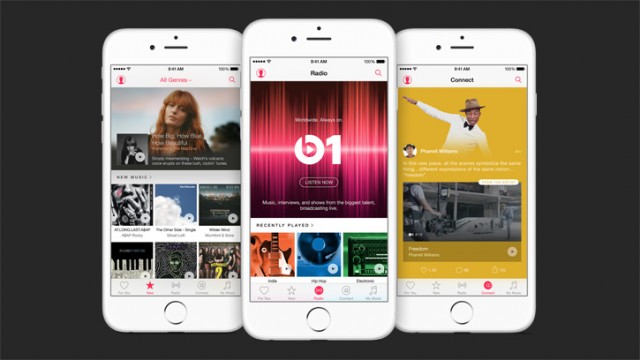It’s not just deja vu. You’ve seen this stuff before. The basic ingredients of Apple Music are all repackaged, refined, or integrated from existing ideas.
It’s Beats Music meets BBC Radio 1 meets Apple Ping, in an iOS and Android app.
What you haven’t seen is all of those ingredients in one place, working together. And that’s not a trivial matter – it might change nothing, but it could change everything.
So, one by one, here what’s feeling like a trip down memory lane:
1. Streaming – Beats Music is back as Apple Music’s core streaming service. That includes Beats’ clever recommendation tools (like its pretty genre select), though seemingly cross-bred with the recommendation engine in iTunes.
2 Radio – BBC Radio 1 gets cloned, sort of as Radio 1 disk jockey Zane Lowe takes on Beats One, a Beats-organized, Apple-branded, 24/7 international radio station. Oddly, Apple claims this is the first such station – isn’t any Internet radio station “global”?
3. A social network – Apple Ping is back from the dead as Connect. (Zach Holman on Twitter was obviously thinking what I was thinking.)
But before you scoff, Ping is looking ahead of its time – launched in 2010, killed in 2012, it was too early to really take advantage of mobile apps. Here, instead of integrating with desktop iTunes (dumb), Apple integrates with mobile apps on iOS and Android (ah hah). There was lip service paid to “bedroom producers” early in the WWDC segment, so I’m guessing we’ll all get access to it. If that’s the case, here are two safe bets: 1. you’ll probably play with it, and 2. it probably won’t reduce any of the work you’re doing managing social media on Tumblr, Facebook, Twitter, Bandcamp, VK, Pinterest, and who knows what else. Maybe you’ll find some free time to actually make music beyond “sharing with your fans”; let’s see. On the other hand, while I’m complaining, I’m not complaining: this stuff can wind up being really powerful, and for that reason, I have to admit I do hope Connect is a success.
Updated: yep, you’ll have access to it.
4. Music videos. Yes, Tidal was making a deal of this. And there’s the elephant in the room – YouTube (to say nothing of everywhere else artists can share videos). But now it’s on Apple’s platform, too. Curiously, note that “ad-free” is a pitch. So there’s actually an incentive to put videos on YouTube (where you can add ads, and you have a huge audience), and not on Apple Music (where you don’t).
All in favor.
Convincing stuff in this presentation: putting things under one app, and putting Apple’s logo on it, is huge. So you’ve seen each of these ingredients before, but Apple has a point when they say they’ve got one ecosystem. They’re on iOS, Mac, and now apparently Android, too. That gives them a huge chunk of the mobile market. (Yet to be seen: will Apple make mediocre Android apps the way that they made a mediocre iTunes for Windows.)
I don’t think that integration is to be underestimated. A lot of us do rely heavily on iTunes; a lot of artists do see a lot of revenue from iTunes. So this could be a good deal.
All against.
Now the reasons to be critical or skeptical – and there are plenty.
From a user side, the problem is that while this offers everything you’ve already got and want in an integrated interface, you’ve already got all of it. You can stream music, not only on Spotify but other services (legal and illegal). If you’re the sort of person who likes radio, you can listen to radio – including BBC Radio 1. You can find videos on YouTube, and artists sharing on Facebook. Sure, Apple can say this stuff is “fragmented,” but that doesn’t necessarily mean people will drop all of those things just because a single app might or might not replace it.
From the artist side, there’s very little explanation of why you shouldn’t hate this. Trent Reznor and Drake seem to think it’s a good idea, but apart from that, we have only questions. What’s the artist split on streaming? How can Apple give streaming to 6 users instead of 1 and still make enough revenue? Given that artists are already complaining they don’t make enough money from streaming, why should this be different? What sort of access will artists have to Connect? Will they be able to see any data on who’s listening to their music, or interacting with any of the social feeds? Why wouldn’t Apple Music streaming simply destroy sales of downloads?
Here’s one intriguing matter. Apple did talk about indie artists – and payouts to indie artists. Is it possible they thought the way this editorial did, and calculated more fairly for individuals? We’ll find out.
Grab the popcorn.
There may be answers to these questions, but not yet. And sure, the service has been out for only a few minutes, except we’ve been asking these questions about similar tools from a variety of vendors for years.
And so that’s really the only question we need to ask. Why will this time be different than the last – with any of this?
I’ll say this: I at least think it’s an interesting question.

